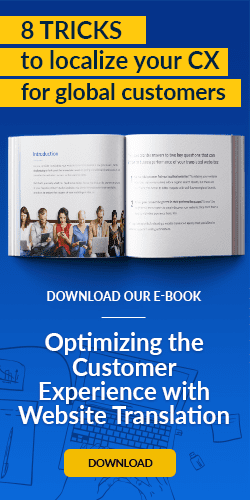Every website translation vendor uses content-parsing algorithms to prepare online content for translation. Some are better than others. MotionPoint’s technology leads the industry.
What Is a Parsing Algorithm?
For those unfamiliar with content parsing, website translation providers use website crawlers, programmed to detect text and other media, to determine a website’s scope of translatable content.
Their parsing algorithms then separate translatable text from code, and determine how to divide this content into easy-to-translate units of text called segments. Segments can be phrases, sentences, or whole paragraphs. These segments are then translated, either by software or human linguists.
What separates MotionPoint’s algorithm from the competition isn’t what it does, but how it does it—and how it generates high-quality segments for translation.
Smart Parsing Saves Our Customers Money
The flexibility of our algorithm, and our ability to granularly customize the scope of website translation projects, saves our customers money.
We’re able to customize the scope of your project to:
- Better align with your business needs
- Optimize the level of translation required
- Get the most value out of a limited translation budget
For instance, MotionPoint can block certain segments to prevent the translation of website pages or sections that aren't mission critical. Sections that feature less important content can be flagged for low-cost machine translation, too.
In addition, MotionPoint always optimizes its parsing to increase segment repetition, which further reduces translation costs. Product descriptions that follow a template are a common example. This content often appears as sentences or headlines with predictable structures across multiple pages—such as a product type, the size of a product, or a product’s color.
MotionPoint always optimizes its parsing to increase segment repetition, which further reduces translation costs.
Other vendors treat every single variation of these phrases as unique segments that require translation. That sends translation costs sky-high. MotionPoint treats this content differently.
Our parsing can be configured to recognize these patterns, and instruct our linguists to proactively translate this template-like structure and all of its contents (such as all the variations of a product's colors, stored in your product database). We then instruct our content-detection technology to ignore these "templatized" phrases on an ongoing basis, since they've already been translated.
Repetitive structures can also be commonly found in meta-descriptions. In these cases, these structures are word-for-word repetitions, with the only difference being a use of double quotes versus single quotes, and the presence of HTML in the meta-description. MotionPoint's smart technology knows this is the exact same content, and standardizes the algorithm to optimize pickup of the virtually identical text for translation.
This ensures these segments are never identified for translation again, reducing translation costs. The translated meta-descriptions provide a bonus SEO benefit.
MotionPoint’s ability to optimize its algorithm for dynamic content is another key differentiator.
Optimizing the algorithm for dynamic content is another differentiator of MotionPoint’s technology. Most websites use dynamically-loaded customized content, such as welcome messages that greet users by name, or content based on a user’s location. This personalized experience is great for customers, but creates a problem for translation vendors. The translatable strings of this dynamically-generated content hide in application code or databases, which flummox most vendors.
To compensate for this lack of expertise, vendors charge their customers to translate a dynamically-loaded phrase translation every time that segment is generated. This sends costs through the roof.
MotionPoint only charges once to translate content, no matter how many times it's used online or off-site. You can continue to deliver personalized online experiences to your global customers without worrying about skyrocketing translation costs.
Conclusion
All website translation vendors use a content-parsing algorithm of some sort, but not all are created equal. MotionPoint’s turn-key solution is created with the purpose of solving the operational cost and complexity of website localization.
While other vendors try to maximize translation spend, our solution—and our content-parsing technology—is designed to provide efficiency and cost-savings, so you can succeed in global markets, and expand to even more.
Last updated on December 05, 2017
